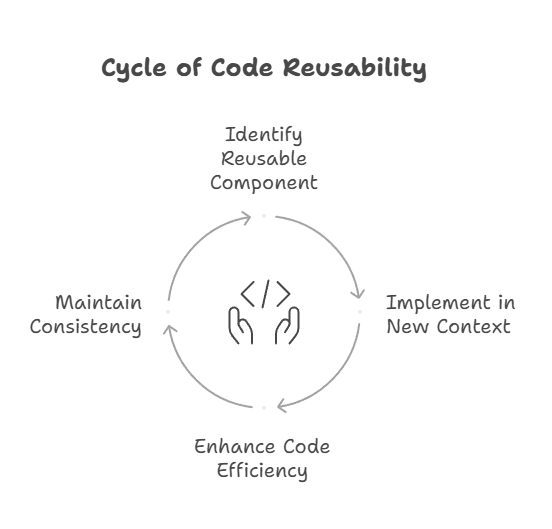Code Reusability and Modularity
Code reusability and modularity are fundamental principles in software development that promote efficiency, maintainability, and scalability of programs. In this chapter, we'll explore these concepts in the context of the C programming language. We'll start with the basics and gradually delve into advanced techniques to maximize code reuse and maintainability.
Understanding Code Reusability
Code reusability refers to the ability to use existing code components in new contexts or applications. It saves time and effort by avoiding redundant coding and promotes consistency across projects.
Example: Consider a function to calculate the factorial of a number:
int factorial(int n) {
if (n == 0 || n == 1)
return 1;
else
return n * factorial(n - 1);
}
Now, this function can be reused in multiple parts of a program where factorial calculation is needed, enhancing code efficiency.

Implementing Modularity in C
Modularity involves breaking down a program into smaller, manageable modules or functions, each responsible for a specific task. This approach improves code organization, readability, and maintenance.
Example: Suppose we have a program to perform various mathematical operations. We can modularize it by defining separate functions for addition, subtraction, multiplication, and division.
int add(int a, int b) {
return a + b;
}
int subtract(int a, int b) {
return a - b;
}
int multiply(int a, int b) {
return a * b;
}
float divide(int a, int b) {
return (float)a / b;
}
By modularizing our code in this manner, we enhance readability and maintainability, as each function focuses on a specific operation.
Header Files and Function Declarations
Header files (.h) contain function declarations, allowing other source files to use functions without needing to know their implementations. This promotes encapsulation and abstraction.
Example: Suppose we have functions defined in a file called “math_operations.h”:
// math_operations.h
int add(int a, int b);
int subtract(int a, int b);
int multiply(int a, int b);
float divide(int a, int b);
Now, other source files can include this header file to use these functions without needing to know their internal details.
Creating Reusable Libraries
Reusable libraries are collections of modularized code that can be reused across multiple projects. They promote code sharing, standardization, and interoperability.
Example: Let’s create a library called “math_library” containing our math operation functions.
// math_library.h
#ifndef MATH_LIBRARY_H
#define MATH_LIBRARY_H
int add(int a, int b);
int subtract(int a, int b);
int multiply(int a, int b);
float divide(int a, int b);
#endif
// math_library.c
#include "math_library.h"
int add(int a, int b) {
return a + b;
}
int subtract(int a, int b) {
return a - b;
}
int multiply(int a, int b) {
return a * b;
}
float divide(int a, int b) {
return (float)a / b;
}
This library can now be reused in multiple projects by simply including the header file and linking to the compiled library.
Advanced Techniques for Code Reusability and Modularity
- Parameterized Macros: Macros in C can be parameterized to create reusable code snippets that adapt to different contexts.
- Dynamic Linking: Dynamic linking allows linking external libraries during program execution, enabling runtime flexibility and code reuse.
- Object-Oriented Design: Though C is not an object-oriented language, principles like encapsulation and inheritance can be simulated to improve code structure and reusability.
Parameterized Macros for Code Reusability
Parameterized macros allow us to define generic code templates that can adapt to different contexts based on input parameters.
Example: Let’s define a parameterized macro for finding the maximum of two values:
#define MAX(x, y) ((x) > (y) ? (x) : (y))
This macro can then be used to find the maximum of any two values:
int a = 5, b = 10;
int max_value = MAX(a, b); // Resolves to ((5) > (10) ? (5) : (10)), max_value = 10
Dynamic Linking for Runtime Flexibility
Dynamic linking allows external libraries to be linked to a program during its execution, providing runtime flexibility and enabling code reuse across different programs.
Example: Suppose we have a program that uses functions from a math library dynamically linked during runtime:
// main.c
#include <stdio.h>
#include <dlfcn.h> // Dynamic linking library
int main() {
void *lib_handle;
int (*add)(int, int);
lib_handle = dlopen("./libmath.so", RTLD_LAZY); // Load library
if (!lib_handle) {
fprintf(stderr, "%s\n", dlerror());
return 1;
}
add = dlsym(lib_handle, "add"); // Get function pointer
if (!add) {
fprintf(stderr, "%s\n", dlerror());
dlclose(lib_handle);
return 1;
}
printf("5 + 3 = %d\n", add(5, 3)); // Use function
dlclose(lib_handle); // Close library
return 0;
}
Here, “libmath.so” is a shared library containing the “add” function. This program dynamically links to the library and uses the “add” function.
Object-Oriented Design Principles in C
While C is not inherently object-oriented, principles such as encapsulation and inheritance can be emulated to improve code structure and reusability.
Example: Let’s create a simple “Point” structure representing a point in 2D space and define functions to manipulate it:
// point.h
typedef struct {
int x;
int y;
} Point;
Point create_point(int x, int y);
void move_point(Point *p, int dx, int dy);
// point.c
#include "point.h"
Point create_point(int x, int y) {
Point p;
p.x = x;
p.y = y;
return p;
}
void move_point(Point *p, int dx, int dy) {
p->x += dx;
p->y += dy;
}
With this design, we encapsulate the data and operations related to points, promoting code reusability and maintainability.
Code reusability and modularity are not just concepts but essential practices in software development, especially in C programming. They enable developers to write efficient, scalable, and maintainable code, which is crucial for building robust software systems.By adopting modular design principles, leveraging parameterized macros, dynamic linking, and even emulating object-oriented design in C, programmers can create reusable components that significantly improve productivity and code quality. Happy coding !❤️
